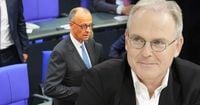In a historic turn of events for German politics, Friedrich Merz, the leader of the Christian Democratic Union (CDU), failed to secure the necessary majority in the first ballot for the position of Federal Chancellor on May 6, 2025. This unprecedented occurrence marks the first time in post-war Germany that a Chancellor candidate was not elected in the initial voting round, a situation characterized by FOCUS Online's chief correspondent Ulrich Reitz as a "gigantic defeat" for Merz.
Despite this setback, Merz was ultimately elected Chancellor later that day with a black-red majority in parliament, following the signing of a coalition agreement between the Union and the Social Democratic Party (SPD). However, the initial failure has raised questions about the stability and authority of the new government.
Reitz, commenting on the implications of the failed first vote, warned against overreacting, stating, "From a state crisis, there can be no talk," while emphasizing that the stability of Germany had taken a hit. He pointed out that Article 63 of the Basic Law ensures the election of a Chancellor through multiple rounds if necessary, thus providing a framework for this political uncertainty.
Lars Klingbeil, the SPD chairman and planned Vice-Chancellor, was also affected by the outcome of the first ballot. Reitz noted that both Merz and Klingbeil are facing an authority problem, as the secret ballot leaves room for speculation about the lack of support for Merz. He stated, "It is a claim when the Union says we have all the votes together." This situation represents what Reitz described as the first vote of no confidence against Merz before he was even elected.
Moreover, Reitz highlighted the SPD's struggle with Merz as a Chancellor candidate, calling it "the greatest imposition for the SPD to have to elect Friedrich Merz as Chancellor." He attributed this challenge to personal and stylistic differences, noting that Merz's decisiveness and authoritative style could be off-putting for SPD members. Internal conflicts within the SPD were also noted, with Klingbeil having generated many opponents during the cabinet reshuffle, further complicating the party dynamics.
Despite the uncertainty surrounding Merz's leadership, Reitz expressed confidence in the functionality of Germany's institutions, stating, "I have trust in the functionality of our institutions." This sentiment was echoed by other political figures, including Klingbeil, who asserted that the failure of the first ballot would not lead to consequences within the SPD faction. He remarked, "We should not speculate on where the no votes in the first ballot came from," emphasizing the need to move forward.
Klingbeil also expressed optimism about the future, stating that the second ballot demonstrated a collective recognition of responsibility among the members of parliament. He affirmed that the SPD faction had supported Merz's candidacy with full backing, dismissing any notions of dissent within the ranks.
Meanwhile, Markus Söder, the chairman of the Christian Social Union (CSU), described the first ballot's failure as a warning to the new coalition. He referred to the situation as leaving "blue bruises" on the coalition's image, suggesting that it highlighted the potential pitfalls of relying on one another. However, he also expressed hope that the initial setback could ultimately strengthen the coalition, stating, "The government was only truly forged today."
On the other hand, Felix Banaszak, co-chair of the Greens, interpreted the failed first vote as a troubling sign for the new government, indicating that Merz and Klingbeil do not have the full support of their factions. He warned that if the new coalition begins as the previous one ended, it could signal difficulties ahead.
In light of the political turbulence, newly elected Chancellor Merz addressed the media after the election, stating, "What a day - with some surprises." He expressed relief that Germany now has a government with a parliamentary majority, emphasizing the importance of unity within the coalition. Merz's predecessor, Olaf Scholz, reflected on the unpredictable nature of the Chancellor's role, recalling advice from former Chancellor Angela Merkel about the uncertainties that come with the position.
Amidst the discussions surrounding the new government, Merz also took a cautious stance regarding the potential banning of the Alternative for Germany (AfD) party. He noted that it would be impossible to forbid ten million AfD voters, acknowledging the need for a thorough evaluation of the Federal Office for the Protection of the Constitution's classification of the party as extremist. Merz stressed that the new coalition's primary focus should be on addressing the underlying causes of voter support for the AfD.
As the political landscape evolves, the first cabinet meeting under Chancellor Merz is scheduled to take place today, signaling the beginning of a new chapter in German governance. French President Emmanuel Macron has already congratulated Merz and confirmed a meeting in Paris to discuss shared agendas, including European sovereignty, security, and competitiveness.
In summary, the events of May 6, 2025, will be remembered as a pivotal moment in Germany's political history, characterized by unexpected challenges and the need for coalition unity. As Merz and Klingbeil navigate their leadership roles, the effectiveness of their partnership and the stability of the new government will be closely scrutinized.





